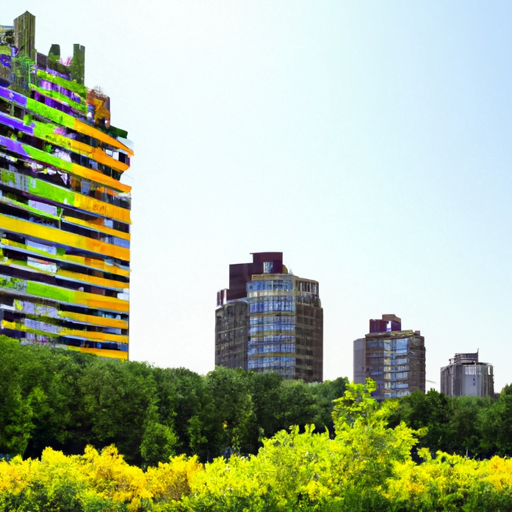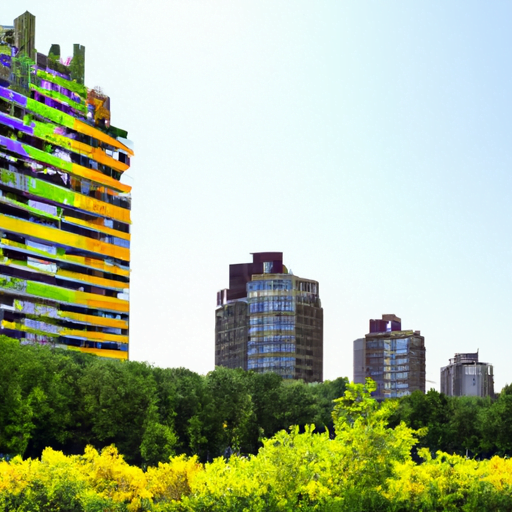Did you ever wonder what it would be like to live completely off the grid? No bills, no pollution, just you and the environment. Sounds pretty great, right? Well, that’s the idea behind eco-cities. These sustainable communities are designed to minimize their environmental impact and promote a more sustainable way of living. But before you pack up and move to one of these utopian cities, there are a few hidden challenges you should be aware of.
First off, let’s talk about the three pitfalls of eco-cities. The first challenge is the high cost of living. While eco-cities may be designed to be sustainable, they often come with a hefty price tag. The technology and infrastructure required to support off-grid living can be expensive, and these costs are often passed on to the residents. So unless you have deep pockets, living in an eco-city might not be feasible.
The second challenge is the limited availability of resources. Living off the grid means relying on renewable energy sources like solar and wind power. While these technologies have come a long way in recent years, they are still not as reliable or efficient as traditional energy sources. This means that there may be times when you need to ration your electricity usage or face power outages. So, if you’re someone who values convenience and reliability, eco-cities may not be the best fit for you.
Lastly, eco-cities often face unique social and cultural challenges. These communities are often located in remote areas, far away from the comforts and conveniences of urban living. This isolation can create feelings of loneliness and a lack of community connection. Additionally, adjusting to the lifestyle and values of an eco-city can be difficult for those who are used to the fast-paced consumer culture of the modern world. So, before you make the leap, it’s important to consider whether you are willing and able to adapt to this new way of life.
In conclusion, while the concept of eco-cities may seem like a dream come true, there are hidden challenges that you need to be aware of. From the high cost of living to the limited availability of resources, living off the grid is not as easy as it sounds. Additionally, the social and cultural adjustments can be difficult for many. However, if you are passionate about sustainability and willing to make the necessary sacrifices, living in an eco-city can be a rewarding and fulfilling experience.

The Hidden Challenges of Eco-Cities
Eco-cities, also known as sustainable cities or green cities, are seen as the future of urban development. These cities aim to create a harmonious coexistence between humans and the environment, with a focus on reducing carbon emissions, conserving resources, and promoting a high quality of life. While the concept of eco-cities is appealing, there are a number of challenges that need to be addressed for their successful implementation. In this article, we will explore the three main challenges faced by eco-cities: inadequate infrastructure, high costs of implementation, and limited public acceptance.
Inadequate Infrastructure
One of the primary challenges faced by eco-cities is the lack of adequate infrastructure. This includes basic amenities, waste management systems, and transportation networks. Without proper infrastructure, the overall functioning and sustainability of eco-cities can be compromised.
Lack of Basic Amenities
One of the main concerns in eco-cities is the lack of access to basic amenities such as clean water, power supply, and healthcare facilities. Sustainable cities aim to reduce water and energy consumption, but this can sometimes lead to limited access to these resources. Without proper planning and allocation, residents may face difficulties in their daily lives.
Insufficient Waste Management Systems
Efficient waste management is essential for the sustainability of eco-cities. However, many sustainable cities struggle with the lack of proper recycling infrastructure, ineffective waste disposal methods, and inadequate sewage treatment. These challenges can lead to environmental pollution and health hazards if not addressed effectively.
Inadequate Transportation Networks
Transportation plays a crucial role in the functionality of any city. In eco-cities, the focus is on promoting sustainable modes of transportation, such as public transportation, cycling, and walking. However, limited public transportation options, lack of pedestrian and cycling infrastructure, and inefficient road systems can hinder the mobility and convenience of residents.
High Costs of Implementation
Implementing eco-friendly practices and infrastructures can be a costly endeavor. The high costs of construction, development, and maintenance pose significant challenges for eco-cities.
Expensive Construction and Development
Building sustainable infrastructure requires a high initial investment. From incorporating renewable energy systems to utilizing innovative materials, eco-cities aim to reduce their carbon footprint. However, these advancements come with a hefty price tag, making it challenging for cities to meet the financial requirements.
Costly Maintenance and Upkeep
Another challenge faced by eco-cities is the ongoing maintenance and upkeep of their infrastructure. Renewable energy systems, for example, require regular upgrades and maintenance to ensure optimal efficiency. Additionally, upgrading transportation networks to accommodate sustainable modes of transport can also be costly.
Budget Constraints for Inclusive Solutions
Striking a balance between social equity and financial viability is a significant challenge for eco-cities. Providing affordable housing and equal access to sustainable resources requires substantial financial resources. Budget constraints can limit the implementation of inclusive solutions, thereby hindering the overall success of eco-cities.
Limited Public Acceptance
Despite the growing awareness and importance of sustainability, eco-cities still face challenges in gaining public acceptance.
Resistance to Change
People are often resistant to change, and the concept of eco-cities challenges traditional ways of living. Transitioning to a sustainable lifestyle may require significant adjustments, both in terms of behavior and mindset. Resistance to change can slow down the progress of eco-cities and hinder their adoption.
Concerns About Loss of Privacy
Living in an eco-city often involves sharing resources and living in close proximity to others. For some, this can raise concerns about privacy. The idea of surveillance and shared amenities may deter some individuals from embracing the concept of eco-cities.
Cultural and Lifestyle Differences
Different cultures and lifestyles may have varying perspectives on sustainability. Eco-cities aim to provide a universal model for sustainable living; however, implementing these models in diverse cultural contexts can be challenging. Adapting sustainable practices to meet the needs and preferences of diverse communities is crucial for the success of eco-cities.
In conclusion, eco-cities face several hidden challenges that need to be addressed for their successful implementation. Inadequate infrastructure in terms of basic amenities, waste management systems, and transportation networks can hinder the functionality of these cities. The high costs of implementing and maintaining sustainable infrastructure pose financial challenges. Additionally, limited public acceptance due to resistance to change, concerns about loss of privacy, and cultural differences can slow down the progress of eco-cities. Addressing these challenges is crucial for the future of sustainable urban development. Eco-cities have the potential to create a better and greener future, provided these challenges are overcome with innovative solutions and widespread awareness.





